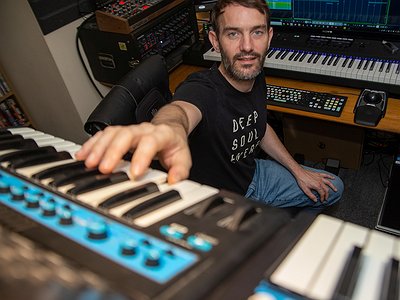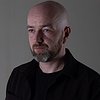Part 1
Name: Searchlight
Members: Cian McCann (Zero T / Bruk Rogers), Dom Purcell (Beta 2)
Nationality: Irish
Occupation: Producers
Current release: Searchlight's self-titled album is out via Fallen Tree 1Hundred.
Gear recommendations: Arturia PolyBrute Analog Synthesizer – best analog poly synth around atm as you have a proper analog synth sound that you can control like a digital synth and the morph feature is incredible ... It's not cheap though!
Oeksound Soothe VST plugin – gamechanger when this plugin came out as instead of spending hours finding resonant/problem frequencies on a track and having to notch these individually out, soothe does them all in one go in far less time.
If you enjoyed this interview with Searchlight and would like to know more about the duo, visit them on Instagram, Facebook, and twitter.
What was your first studio like?
DOM: My First Studio consisted of an Intel i386 PC running a tracker program called Fast Tracker 2 with a cheap Kawai keyboard with a pair of Pioneer CS 757 speakers.
CIAN: Mine was a shared space with another guy, I had an EMU ESI4000 and Tannoy Reveals, and he had a YAMAHA 02R digital desk, a Novation Bass Station and a Roland JP8080
How and for what reasons has your set-up evolved over the years and what are currently some of the most important pieces of gear for you?
DOM: My setup has gone throught a few changes over the last 29 years but the biggest evolutions were when I changed from an ITB (in the box) setup in 1993 using a Tracker, to then a setup out of the box using all external gear (synths, samplers, mixer etc.) in 1995, to then go back ITB again when PCs got powerful enough to run more than 6 tracks of audio @ 8bit (lol) and using just internal vst instruments and effects in about 2003, to then a combination of both ITB audio and using external gear in 2006!
Really though the most important gear is a good reliable computer, a good controller keyboard and most importantly a great idea. I think a great musical idea trumps any gear / studio to be honest.
CIAN: The main difference is the switch from outboard hardware to almost everything being in the box.
Around 10 years ago, I unfortunately had a studio break in and all my hardware was stolen. I have replaced the Mackie mixing desk but seeing as my approach is a sample based one, a turntable and a pile of old records is my most vital piece of production equipment.
Some see instruments and equipment as far less important than actual creativity, others feel they go hand in hand. What's your take on that?
DOM: This continues on from what I touched on previously in that you can have the best equipment in the world but if you don't have a good musical idea just writing bland music, it doesn’t matter how good the studio / equipment is or how good it sounds mixwise, you can’t polish a turd as the old saying goes.
Whereas if you have a really great musical idea and if it's just made on a cheap laptop in your kitchen that will always musically shine through then the bland music made on the best equipment. Creativity is definitely more important for me. (but having some great gear helps haha!)
CIAN: I’m not a techy person at all. Machines are a means to an end only for me. Creativity is king, what equipment you have is irrelevant.
How many examples do you need: Dizzie Rascal made his first LP on a Playstation. Skream and Benga took over the world with Fruity Loops. DJ Shadow made Endtroducing with 1 x turntable and an MPC60.
I'm also firmly of the belief that a lack of limitations can be the death of creativity.
A studio can be as minimal as a laptop with headphones and as expansive as a multi-room recording facility. Which studio situation do you personally prefer – and why?
DOM: It really depends of what you are trying to achieve – if you are trying to mic up an orchestra or choir or a band, just a laptop and headphones wouldn't really cut it. So a professional facility really would be the optimal choice here.
I think really to be honest that “Studio“ is a state of mind now, not a place in 2022, because as the technology has improved year after year you can now create a really impressive track on a laptop with headphones at home that sounds as professionally produced as anything that was recorded and multitracked in a professional studio.
To me it doesn’t really matter where I make the music - the end result is all that counts, but if I had to choose I would choose my own studio, is that allowed?! Haha! (Disclaimer – a studio with an amazing view like the Almafi Coast or somewhere just as amazing could probably eek a small bit more creativity out of me if I am honest!)
CIAN: Horses for courses … I like different situations for different parts oft he process. Alone in your own space, mostly on headphones, is my preferred mode of writing, but I absolutely love being in a room with singers and musicians, directing their performance too.
From traditional keyboards to microtonal ones, from re-configured instruments (like drums or guitars) to customised devices, what are your preferred controllers and interfaces? What role does the tactile element play in your production process?
DOM: When talking about electronic music the tactile element is so important for me in my studio in 2 ways; In one way I have alot of controllers that I use in my setup for controlling my DAW / software - from the motorised faders of my Icon Platform M+ and 60 plus buttons of shortcuts on my Icon Platform B+ both for Cubase, to the bespoke shortcuts I have also created on my Komplete Kontrol S88 keyboard for plugins to my many other input devices, controllers and faders, this is all extremely handy and time-saving for controlling software / DAW and effect Plugins.
The 2nd way is for actually inputting notes / drum hits / cc (continuous controller) messages using equipment - from the many keyboard synthesizers I use to create sounds and play in musical notes and drum hits into the track, to the drumpads I use for also inputting drums (or sometimes musical notes too), to the special infrared controllers I use for building up string / orchestra creation ideas, to the sliders I use for inputting CC messages, a tactile setup is just so important for me.
I don't want to use just a mouse – I am a musician not a mousician! I think it is also so important to actually play musical notes into the track using a keyboard then to just draw them in with a mouse as you don't get any vibes / feeling into the music by just drawing notes in and it all sounds too straight / no feeling. When you actually record notes in from a keyboard there are tiny imperfections of where the notes lie (quantize) and how loud they are (velocity) amongst other things (aftertouch etc.). It's these imperfections that make the music perfect in my opinion.
CIAN: My set-up is extremely stripped down. A purpose-built PC laptop with Cubase with a weighted MIDI keyboard. Making programmed dance music you can easily go through the whole process without ever touching the keyboard; everything drawn in or shuffled around.
With Searchlight music recording live takes of playing an instrument on the keyboard is vital for giving it that live, human feel, the imperfections and variations in timing and velocity etc..
Most would regard recording tools like microphones and mixing desks as different in kind from instruments like keyboards, guitars, drums and samplers. Where do you stand on this?
DOM: I think that mixers and microphones can be used as instruments - like the way you could hit a mic a certain way with say a drum mallet or pen or whatever and record that sound into your track to use and also by using the mixing desk as an instrument by riding faders to get that delay feedback sound under control etc. Like the way many dub producers used to (King Tubby etc.) You can hear this effect on the “Line Of Sight” track on the Searchlight album.
CIAN: Anything can be an instrument. I once used an A4 sheet held over the air vent on the back of a monitor speaker. Blasted a bassline through the speaker and used a mic to record the flapping of the paper and then took that back into the DAW, filtered, effected and layered it back over the bassline.
One thing that unified us as a duo is our shared love for particular instruments. Top of that list is the Fender Rhodes piano … on the flip side of that coin; we are both broadly averse to saxophones (with notable exceptions).
Regarding innovation versus tradition: I personally am not particularly interested in being an innovator per-se. But what drew me into music production was 90s era Jungle music. Specifically how it drew from old traditions, inherited through heritage but filtered through modern life in the UK to become something completely new.
Generally speaking, I just make music I would like to listen to and don’t think too heavily about innovating.






